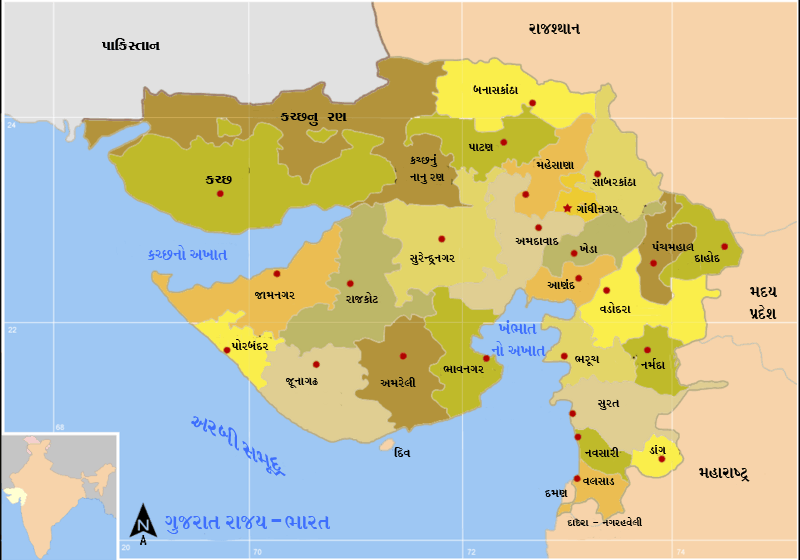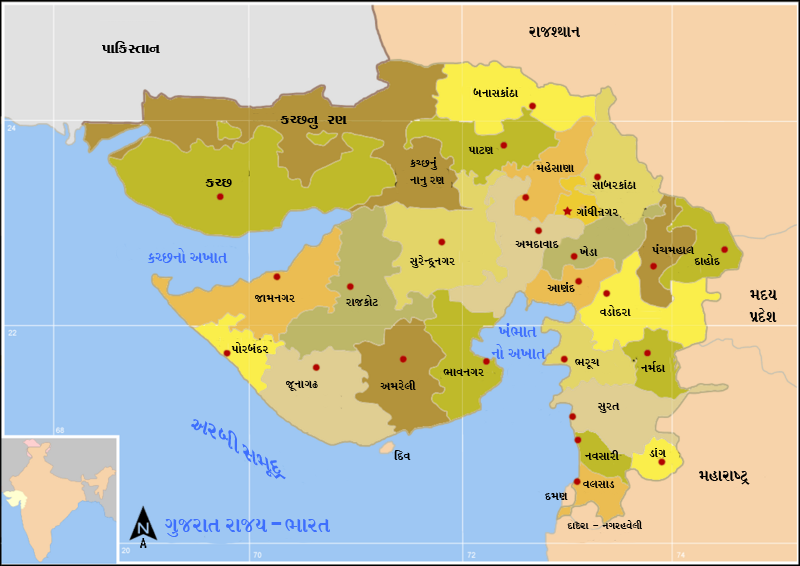
The History of Gujarat: From Ancient Roots to Modern Times

Gujarat, a vibrant state located on the western coast of India, boasts a rich and diverse history that spans thousands of years. Known for its strategic coastal location, prosperous trade, cultural diversity, and contributions to India’s independence movement, Gujarat has played a vital role in shaping the subcontinent’s destiny. This article traces the historical journey of Gujarat from ancient times to the present day.
Ancient Gujarat: Cradle of Civilization
The earliest traces of human settlement in Gujarat date back to the Indus Valley Civilization (Harappan culture), around 3000 BCE. Major archaeological sites such as Lothal, Dholavira, and Surkotada showcase Gujarat’s prominence in maritime trade, town planning, and metallurgy.
- Lothal was one of the world’s earliest known dockyards, highlighting Gujarat’s ancient maritime prowess.
- Dholavira, located in the Rann of Kutch, is renowned for its sophisticated water conservation systems and urban planning.
These settlements were part of a flourishing network of trade between Mesopotamia and the Indian subcontinent, with Gujarat as a significant maritime hub.
Medieval Gujarat: Kingdoms and Empires
After the decline of the Harappan civilization, Gujarat saw a succession of powerful kingdoms:
Mauryan Period (circa 322–185 BCE):
- Under Emperor Ashoka, Gujarat became part of the Mauryan Empire.
- The spread of Buddhism flourished, evident from Ashokan edicts found in Junagadh.
Western Satraps and Gupta Period:
- The Western Satraps (Kshatrapas) ruled for centuries, followed by the Guptas.
- During this period, Gujarat emerged as a hub for Hindu and Jain learning and architecture.
Solanki Dynasty (10th–13th century):
- The Solanki Rajputs brought prosperity and patronized art and architecture.
- Temples like the Modhera Sun Temple and Rani ki Vav (a stepwell in Patan, now a UNESCO World Heritage site) were built.
Delhi Sultanate and Gujarat Sultanate (14th–16th century):
- The region came under the Delhi Sultanate before gaining independence under the Gujarat Sultanate, founded by Zafar Khan Muzaffar.
- The Sultanate established Ahmedabad in 1411 under Ahmad Shah I, which became a thriving center of culture and commerce.
Mughal & Maratha Era
Mughal Rule (1573–18th century):
- Emperor Akbar annexed Gujarat, making it a key province in the Mughal Empire.
- The region benefited from peace and trade under Mughal governance, especially under Jahangir and Shah Jahan.
Maratha Rule (18th century):
- The Marathas gradually replaced Mughal control, although political instability and regional conflicts persisted.
- Gujarat remained a contested area between various Maratha clans and princely states.
Colonial Gujarat: Under the British Raj
By the early 19th century, Gujarat fell under British East India Company control. It was incorporated into the Bombay Presidency.
- The British exploited Gujarat’s ports and cotton industry but introduced railways and administrative reforms.
- Famines and economic hardship led to periodic unrest.
Contribution to the Independence Movement:
- Gujarat produced some of India’s most influential freedom fighters, most notably Mahatma Gandhi, who was born in Porbandar in 1869.
- Gandhi’s Salt March (Dandi March) in 1930 began from Sabarmati Ashram in Ahmedabad, becoming a defining act of civil disobedience.
- Other notable leaders from Gujarat include Sardar Vallabhbhai Patel, known as the “Iron Man of India,” who played a crucial role in uniting princely states post-independence.
Modern Gujarat: Post-Independence Era
Formation of Gujarat (1960):
- After independence in 1947, Gujarat was part of Bombay State.
- In 1960, due to linguistic reorganization, Gujarat became a separate state on May 1, 1960, with Ahmedabad as its first capital (later changed to Gandhinagar).
Economic Growth & Industrialization:
- Gujarat has emerged as one of India’s most industrialized states.
- Key sectors include petrochemicals, diamonds, textiles, and pharmaceuticals.
- The state’s entrepreneurial spirit has made cities like Ahmedabad, Surat, Rajkot, and Vadodara important economic centers.
Natural Challenges and Development:
- Gujarat has faced natural disasters like the 2001 Bhuj earthquake, which devastated Kutch but also showcased the state’s resilience and rapid reconstruction efforts.
- The Sardar Sarovar Dam, while controversial, became a symbol of development and water management.
Cultural Heritage
- Gujarat is known for its rich traditions in folk dance (Garba and Dandiya Raas), festivals (Navratri, Uttarayan), handicrafts, and cuisine.
- The state’s architecture ranges from Jain temples in Palitana and Girnar to Islamic monuments in Champaner and Ahmedabad (also a UNESCO World Heritage City).






